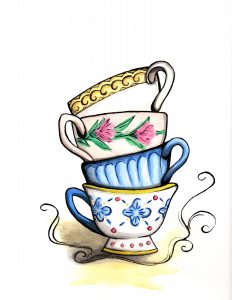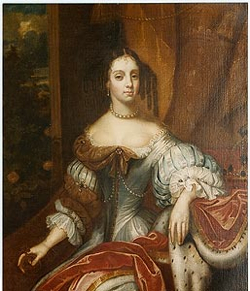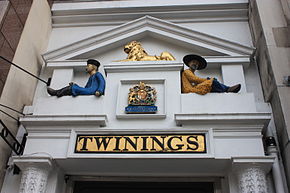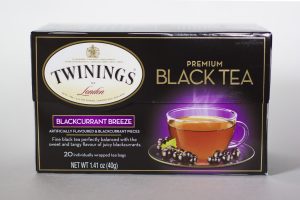
England Without Tea?!
It is hard for us modern-day Americans to imagine England without tea. What?! England without tea?! In Will Shakespeare’s day, that was (gasp!) indeed the case.
Have you heard the expression, “for all the tea in China”? It is from China that the drink made from boiled water and special leaves spread to Japan, Southeast Asia, Indonesia, and India. The adventurous Portuguese led the way for Europe. The first documented mention of tea by a European was in a letter home from China by Portuguese Jesuit Father Jasper de Cruz in 1560. Tea would eventually become the favored beverage of Portuguese royalty, but it would be the Dutch who would first make a big business of the tea trade. The Dutch brought the first tea into Europe from Japan in 1610.
However, Britain’s famous diarist and government official, Samuel Pepys, would first taste a “Cupp of Tee” in 1660. At that time, a pound of Dutch imported tea cost some 60 shillings in London, when the average daily wage for a laborer was less than one shilling. Tea was a luxury by cost and a medicine by reputation.
Queen Catherine from Portugal Brought Tea
 Two years after Pepys tasted his first tea, newly restored monarch, English King Charles II, needed to cover a load of debt. The royal wealth of Portugal’s princess, Catherine of Braganza, offered an attractive solution. The soon-to-be English Queen Catherine arrived in May, 1662, with ships of luxury goods, including a chest of tea. British ale did not agree with Catherine. She wanted her familiar tea. By 1663, in spite of her discomfort with the classic bawdiness and silliness of the English court, Catherine became a trend setter. Tea became fashionable among those who could afford it. Mr. Shakespeare was almost half a century in the grave.
Two years after Pepys tasted his first tea, newly restored monarch, English King Charles II, needed to cover a load of debt. The royal wealth of Portugal’s princess, Catherine of Braganza, offered an attractive solution. The soon-to-be English Queen Catherine arrived in May, 1662, with ships of luxury goods, including a chest of tea. British ale did not agree with Catherine. She wanted her familiar tea. By 1663, in spite of her discomfort with the classic bawdiness and silliness of the English court, Catherine became a trend setter. Tea became fashionable among those who could afford it. Mr. Shakespeare was almost half a century in the grave.
Meanwhile, King Charles II was busy empowering the British East India Company to trade wherever they wished. One of Catherine’s “gifts” to Charles was Bombay, India. (Nice gift.) The king rented the valuable port out to the East India Company. The tea trade would go up and, as supply increased, the price would begin to come down.
No Coffee for Shakespeare?!
Can a writer write without coffee? Will did, as it didn’t become readily available in England until the mid-1600s. Will made his exit in 1616.
Before the court was drinking tea, London had established its first coffee houses in the 1650s. They grew in number and popularity, though it was the era’s “man cave.” It was not a proper atmosphere for a woman. In time, a cup of coffee and a newspaper could be had for a penny, along with fellowship with the fellows and lively conversation. “Penny universities” they were called. By the turn of the 18th Century, there may have been some 2,000 coffee houses in London, many dedicated to a certain clientele, such as soldiers or poets or whatever. But no Will.
Ever Heard of Twinings?
 Then, in 1706, a young man of 31 named Thomas Twining bought what was already called Tom’s Coffee House on the Strand and added tea to the menu. London society women still had to remain outside in their carriages while footmen went inside to fetch tea. When Twining expanded to the building next door in 1717 and opened the Golden Lyon tea shop, women of some means could now buy tea to brew at home. The tea party was born!
Then, in 1706, a young man of 31 named Thomas Twining bought what was already called Tom’s Coffee House on the Strand and added tea to the menu. London society women still had to remain outside in their carriages while footmen went inside to fetch tea. When Twining expanded to the building next door in 1717 and opened the Golden Lyon tea shop, women of some means could now buy tea to brew at home. The tea party was born!
Was this healthy? Actually, yes. Tea was one more (and non-alcoholic) option to water, a drink that Londoners did not like, for matters more than taste. Water in an evermore crowded and dirty London could be lethal. Ales, gin, and coffee were the fare of the common folk. Boiling water for coffee, cocoa, and now tea, whether they knew it or not at the time, helped decrease the incidence of water-borne disease. In addition, tea possessed some anti-bacterial properties. [See Alan Macfarlane, King’s College, Cambridge]
Twining’s son Daniel took over the business in 1741 and began to export tea. According to the 300+-year-old company’s website, ledgers show the Governor of colonial Boston to be a customer in 1749. In 1771, Thomas Twining’s grandson Richard took over the shop. (Two years before the “tea and tax party” in America.) He became chairman of the London Tea Dealers. Over the years, taxes on the British tea trade had risen to an outlandish level and smuggling had flourished to equal and exceed (perhaps to 2/3rd) the level of legitimate trade. The British East India Company’s right to exclusive distribution to all of Great Britain, Ireland, and dependencies was thus rendered a heavy blow. Smuggling was a very great evil for all in the tea trade, including those dealers who, like Richard Twining, believed in fair trade and wished to remain legal. Twining hoped to see smuggling defeated by reasonable prices (reasonable taxes!), sufficient supply, and a market price affordable to the greater public. Along with the directors of the East India Company, he made his views known to the new Prime Minister, William Pitt the Younger, who took office in 1783.
A scheme was conceived and passed called the Commutation Act of 1784. It lowered taxes over 100% (!) to 12.5%, and raised the Window Tax to compensate the treasury. (What do they always say? “We have to pay for it!” Of course, soon there were many fewer windows!) The smugglers naturally fought for all they were worth. It was a sticky wicket for a while. Richard Twining wrote to explain it all in his Observations on the Tea and Window Act and on the Tea Trade, published in 1785. You can read it for yourself at Google Books. But, in the end, smuggling was greatly reduced and tea was much more affordable. It was truly tea time in jolly old England!
 See the Twinings.co.uk website. They are still there, doing global business in the same building, at 216 The Strand, London. Here you see a Twinings of London box of Black Tea from a grocery shelf in North Texas in 2016. Over 300 years of history!
See the Twinings.co.uk website. They are still there, doing global business in the same building, at 216 The Strand, London. Here you see a Twinings of London box of Black Tea from a grocery shelf in North Texas in 2016. Over 300 years of history!
A curtsy to Englishteastore.com. for more background and for the reference to Richard Twining’s Observations. I found them for their excellent blog, but am also enticed by their online product line, which is everything tea and British, despite that they are in Pennsylvania! Tea lovers, take a look. Also see the UK Tea & Infusions Association at Tea.co.uk. Now, go brew a cup!

